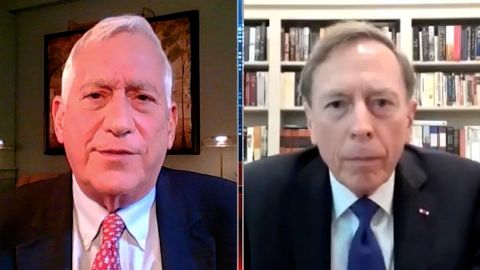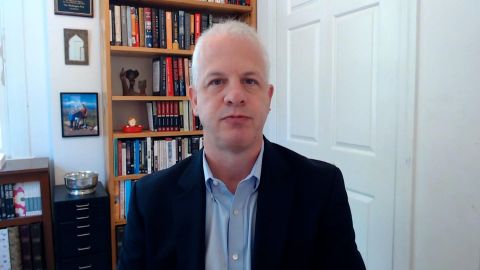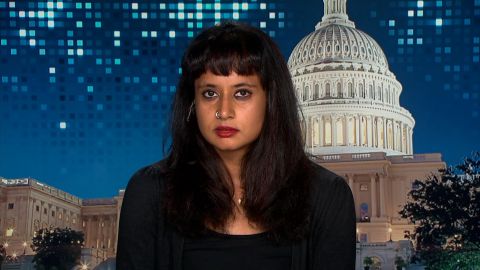Read Transcript EXPAND
BIANNA GOLODRYGA: And we continue our coverage of Afghanistan now with one of the most recognizable faces from the war on terror. Retired General David Petraeus spent nearly four decades in the U.S. Army. In 2010, President Obama made him commander of forces in Afghanistan. And he then went on to become CIA director. Here he is speaking with our Walter Isaacson.
(BEGIN VIDEOTAPE)
WALTER ISAACSON: Thank you, Bianna. And, General Petraeus, welcome to the show.
DAVID PETRAEUS, FORMER CIA DIRECTOR: Good to be back with you, Walter.
ISAACSON: We have been talking all week about the American withdrawal from Afghanistan, but I want to take you to the last 20 years in Afghanistan. Was that a failure? And, if so, what was the cause of the failure? Was it a policy failure, an execution failure?
PETRAEUS: Well, look, I’m sure that we made mistakes at probably every level, tactical, operational, strategic, policy, you name it. But we also achieved a great deal at every single level, not the least of which, of course, was ensuring that the al Qaeda sanctuary in the 9/11 attacks was removed from Afghan soil, along with a regime that allowed them to have that sanctuary and then refused to remove them from it. And for 20 years, frankly, the Afghan people — and I have had a lot of e- mails from Afghans that I know who said at least we had 20 years of real freedoms, of real opportunities, of the ability to — for women to go to university, and all the rest of this. But, certainly, there were setbacks. I actually stated back in 2010 that we hadn’t done the inputs right in Afghanistan for the first nine years that we were there. We were always shooting behind the target. We were always reacting to what the Taliban was doing when it regrouped, then when it came back in. We were very slow to develop Afghan security forces and institutions. And for those that say we shouldn’t have been in nation-building, if you don’t do nation-building, how do you actually leave? You have to hand off the task you’re performing, security tasks and other governance tasks.
(CROSSTALK)
ISAACSON: But wait. That didn’t work. I mean, the counterinsurgency strategy, everything that you’re talking about, even in the past 10 years, we started to hand things off, and the Taliban just came right on in. What happened?
PETRAEUS: Well, I would take some issue with that, I think, Walter. Certainly, the security situation in recent years did erode. But, certainly, during the time that I was privileged to command the International Security Assistance Force and U.S. forces there, we accomplish the missions we were assigned, halt the momentum of the Taliban, roll them back in key areas, accelerate the development of the Afghan security forces, who, by the way, fought and died for their country in huge numbers. I think a lot of us have taken issue with these accusations that they wouldn’t fight for their country; 66,000 of them died over the years, most of them in the last six years or so since we transitioned fully the front- line fighting, by and large, to Afghan security forces.
ISAACSON: But were you surprised that they crumbled so badly at the end?
PETRAEUS: Not entirely. In fact, if you look at the record some months prior to that collapse, I said, as did others, that were worried about the psychological impact, not just of the U.S. withdrawal of its forces, but with the withdrawal of our airpower, and the ability to bring that airpower to bear on the enemy in critical locations, and the withdrawal of the 8, 500 coalition forces who couldn’t stay if we didn’t, and, perhaps even more important, but often overlooked, the withdrawal of the 17,000 or 18,000 contractors that kept the sophisticated U.S.-provided helicopters and planes operational. And as soon as Afghan forces knew no one had their back — keep in mind, early on in the offensive, Afghans were fighting. They were bringing commandos out to those battles and so forth. They were providing close air support, but they eventually flew their own air force into the ground. It couldn’t be maintained at the operational tempo without our contractors. And they knew that we couldn’t come to the rescue anymore. Even if we could bring airpower overhead, we didn’t have the joint tactical controllers and liaison teams and their headquarters, drones, over time to actually bring that to bear. When Afghans detect a shift in the wind, and they see others surrendering around the country — to be fair, the Taliban had quite a good offensive, simultaneous all around the country, to which the Afghans could not respond adequately. And as soon as those soldiers realized that there’s no one coming to the rescue, there’s no aerial medevac, emergency resupply or close air support, they did what soldiers in Afghanistan have done over many, many centuries of empires and other countries washing across their land. They cut a deal and so did the local leaders in those areas, in coordination with those military commanders. So, again, I very much reject the idea that nothing was accomplished and that it all was for naught. And, again, we also brought us Osama bin Laden to justice. There were numerous other accomplishments during that period in Afghanistan in the greater effort against Islamist extremists.
ISAACSON: How much harder is it going to be to fight this battle against the extremists without having some foothold right there to do it over the horizon, as people say?
PETRAEUS: Very much harder, obviously. Again, everything that is going to be overhead is going to have to fly off a carrier that’s parked off Southwest Pakistan, which we just can’t afford to do. That needs to be in the Indo-Pacific. That’s where the focus needs to shift. The whole rebalance to the Indo-Pacific was one of the rationales for leaving Afghanistan, to get this off the Situation Room table, so that other, more important endeavors could be on it. I don’t think that has worked, frankly. They have done nothing but sit at the Situation Room table for a number of weeks and months. But, otherwise, it has to come from the Gulf states. And that’s a very long flight. Just in very simplistic terms, it could take as much as 60 percent of the flying time of our top-of-the-line drone, the Reaper, just to get to and from Afghanistan. And those aren’t refuelable right now. Our fighter bombers will have to be refueled several times to get them there, keep them on station and return them. It’s publicly known that we blew up Eagle Base, a spectacular CIA base that was quite near to the airport in Kabul, a number of other locations. Surrogate forces are gone. All of this will have to be cobbled back together in some fashion, a very different one, to be sure. And, certainly, we have capabilities now that we didn’t even dream of prior to 9/11 when it comes to all of the advances that have to do with social media, connections to the Internet, cell phones, and you name it. But it is going to be vastly more challenging, unless the Taliban are true to their word that they will not allow al Qaeda and the Islamic State to have sanctuaries on their soil. So, again, we have to see, what will be the nature and the character of the governance of this regime? And as we were discussing just before we came on, I think we may have considerably more influence with them now than we have had certainly since we had that abysmal negotiated agreement in the previous administration, where we basically negotiated
PETRAEUS: — influence with them now than we have had certainly since we had that abysmal negotiated agreement in the previous administration where we basically negotiated our own departure, excluded the Afghan government from the negotiations, and forced the Afghan government to release 5,000 Taliban detainees as part of an agreement, again, to let us do what the Taliban wanted us to do, which was to leave. Now, they’re broke. The U.S., Japan, a handful of other donor nations, but predominantly the U.S., had traditionally provided somewhere around 75 percent of the Afghan budget. Obviously, that’s all frozen. That assistance is just on hold. All of their reserves around the world, by and large, are frozen, the biggest in the U.S. The IMF and the World Bank have on hold what they might have done there, very considerable assistance projects. A lot of the international organizations have thinned down or gone home. So, they’re in a very serious situation, a country that imports a lot of its electricity from neighboring nations, generates electricity with refined fuel products that they import and a whole host of other goods and services. They run a massive trade deficit every year because of this. And again, we have been the ones that typically have made up the difference. And I don’t think that you’re going to see China, Russia and Iran, three countries that could provide some assistance, and Pakistan, come anywhere near to making up that difference. It’s just not in their repertoire. And even if China were to do a project there, in the Belt and Road, it would be probably, we’ll loan you money to build this bridge, our engineers and workers and others will build that bridge. So, they should be desperate right now.
ISAACSON: But wait. Wait a minute. Your argument here that we may have more leverage over the Taliban after this withdrawal, isn’t that ironically sort of an argument that we should have done this earlier?
PETRAEUS: No. No, I mean, I don’t think you can construe replacing, however imperfect and flawed and (INAUDIBLE) frustratingly, whatever corrupt or what have you the previous government was, I don’t think you can construe its replacement with the Taliban as anything other than, frankly, disastrous. But we are where we are. And you now have to look forward. And as you do look forward, we do have enormous influence, and of course, we’re already exercising it. To its credit, the administration moved out very quickly, U.N. Security Council already passed a resolution, that you will have seen, the group of 100 countries passed — signed off on another. And so, the Taliban, I think, will realize that if they want to survive, if they want to keep the lights on in Kabul, I think it’s that basic, they are going to have to change the way they governed in the past. That will be (INAUDIBLE) and we’ll see if it’s even possible, because, again, there are a lot of individuals all throughout the country that will interpret this their own way. And then we have to pursue our very near-term objectives of ensuring that the remaining U.S. citizens in Afghanistan can get out if they want. Same for green card holders. And then, this category that we really don’t have a full accounting of how many made it into that pool of 120 some odd thousand, a number of which went to other countries. Of course, it’s not strictly that which came out on the U.S. airlift. But what about the special immigrant visa holders or applicants? These are individuals who spent two years on the ground with our men and women in uniform to earn that as battlefield interpreters, sharing risk and hardship. We have a moral obligation to them.
ISAACSON: If I heard you correctly, and if I’m wrong, tell me, you’ve said, and you just said earlier in the show, that as soon as we announced our withdrawal, as soon as we were starting to pull out, that let loose this wave of the Taliban being able to come back. I don’t get it. Is that an argument that we should have just stayed there indefinitely?
PETRAEUS: Well, I think we had alternatives. And again, we’ve stayed indefinitely in lots of other countries around the world. Certainly, they’re not at war the way the Afghan situation was. But there was an alternative of 2,500 to 3,500 troops. It was put forward by our military authorities, Pentagon, it obviously was not adopted.
ISAACSON: But wait. What would have happened if we had left those troops sitting there and the Taliban had started to advance?
PETRAEUS: Well, they were advancing. We aren’t on the front lines. We hadn’t been on the front lines for some years. So, the idea that all of a sudden we — you know, we have had fewer battlefield casualties not just in the last 18 months, but in the last several years, all around the world, our battlefield losses have been far less than the number of training accident losses. So, again, we’ve dramatically changed how we’re able to fight because of the proliferation of drones. Drones have truly changed what we have done. You saw this, of course, Walter, when we did go back into Iraq. We had to because the Iraqi government, not the U.S., the Iraqi government took its eye off the Islamic State, which had been destroyed, al-Qaeda in Iraq was destroyed during the surge. But if you take your eye and pressure off an extremist group, it will reconstitute. So, again, one can ask, what has been achieved by the “war on terror or the fight against Islamic extremists,” which is still ongoing and will be ongoing for some time? That I think is the most significant metric on which to focus. But I think we have learned how we have to deal with them. And above all, we recognize, I think, that we have to keep an eye and pressure on them, albeit always where we can, through host nation forces rather than by our own men and women on the front lines, unless it’s absolutely necessary.
ISAACSON: The “Washington Post” has published what we call now the Afghanistan papers, like the Pentagon papers, that shows over the past 20 years the amount of misinformation and somewhat misleading and, at times, false information we kept getting given. What is your response to that?
PETRAEUS: Well, I think there undoubtedly is something to those allegations or those statements, those criticisms. I will tell you that I did go back and look at what I said publicly to Congress when I was the commander of the U.S. Central Command, the commander in Afghanistan and then the CIA director, though you don’t do too much publicly as a CIA director. Bob Kagan did the same thing and actually went back, and I was very qualified in what I said. I specifically said at various points, I told members of Congress, we’re not going to be able to do in Afghanistan what we did in Iraq. We can’t drive violence down by 85 percent as we did during the surge. We’re not going to have this huge successful reconciliation effort. It’s just different. The enemy has sanctuaries in Pakistan, we can’t reach their headquarters and their leaders. We can’t put the pressure on them that we could in Iraq. The country has no money, it has very limited infrastructure, it’s highly illiterate, it’s mountainous. You know, we used to say in Iraq, the human terrain is the decisive terrain. Well, you know, when you’re in the shadow of the Hindu Kush, that’s fairly significant and decisive as well. So, it was just a very different context. And interestingly, although the violence levels in Afghanistan were really quite a good bit less than those in Iraq for most of the time, nonetheless, the challenges, the context of Afghanistan was vastly more difficult. But, look, I think there’s some of that that is natural that people come in and, again, they’re invested in it and you end up with a slightly more rosy picture. It’s why leaders have to insist on objectivity and speaking truth to power and all the rest of that.
ISAACSON: One of the many really interesting things you’ve said in this interview is that we now may have more influence on the Taliban, and you said that China won’t be able to step in as easily, even with its Belt and Road projects, to fill the gap there. China says that it’s going to recognize the Taliban government. Can you imagine that perhaps the United States should give formal recognition to that government sometime in the foreseeable future?
PETRAEUS: Well, I would qualify, again, there need to be conditions. Ideally — and military men always would like to see conditions met before you take certain actions, and I would hope — and I’m sure, actually, that this administration will establish certain conditions, certain metrics by which it will judge Taliban rule and governance. And if those metrics or conditions are met, it’s not unconceivable. And again, this is where we need to understand that, again, the past is past. That’s over. You can, you know, keep thinking that this is a bad dream, as I have for several months now, particularly the past several weeks, as many veterans have who were highly invested and committed to this. But you wake up and it’s not a dream. It’s not just a nightmare. It is reality. OK, this is reality, and now, how are we going to adjust our actions in accordance with the reality? And, again, I think the administration has already moved out pretty smartly in that regard. Secretary of State Tony Blinken has spoken about this on several occasions already, as has the president. And that needs to be the thrust. And, of course, our embassy, if you will, has displaced to Qatar. That is where the negotiations traditionally were held with the Taliban. I actually think — I suggested a week or two ago that, you know, why are we leaving this embassy, $450 million worth of beautiful infrastructure, when it’s very clear that the Taliban have what they want? They won. They own Afghanistan, for better or for worse. They don’t want to kill Americans at this point and give us a reason to unleash our military on them. And I suspect that we are ALSo evaluating that and determining what would be necessary to mitigate the risks of putting our diplomats, development workers, military attaches, intelligence officers and so forth back in to that beautiful embassy structure, that is ALSo, of course, not that far from Kabul airfield.
ISAACSON: General David Petraeus, thank you so much for joining us.
PETRAEUS: Thank you, Professor.
About This Episode EXPAND
Shefali Luthra; Craig Whitlock; Gen. David Petraeus; Ady Barkan
LEARN MORE



